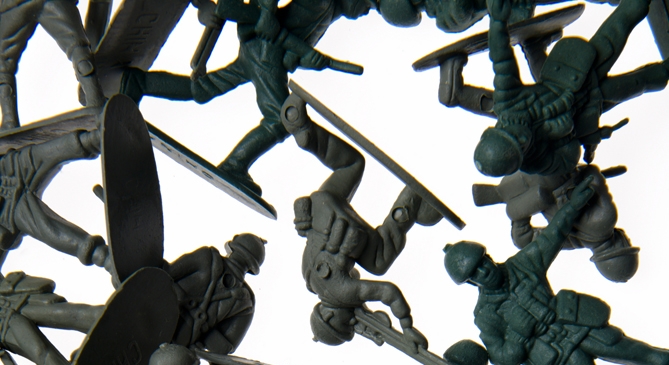
Will the recession make Europe's militaries weaker?
Governments across Europe are about to slash their defense budgets - but they need to ensure they cut correctly.
The economic crisis has wracked government budgets across Europe, as revenues have fallen and spending on stimulus and bailouts has soared. Already, there are signs that defense spending across the continent will suffer. Finance ministers will be looking for ways to reduce deficit and debt, and military budgets are a tempting target.
Such budget cuts will have some salutary effects: Defense establishments, with their resistance to civilian oversight and emphasis on continuity, tend to get bloated in times of relative plenty. It often takes a crisis to force meaningful reforms. But cuts also threaten to sap the effectiveness of European fighting forces and leave parts of the world exposed to insecurity.
The easiest portion of the budget to cut is operations. But it's also the most important portion. Withdrawing soldiers from faraway places plays well at home and requires no layoffs, but it means fewer troops in some of the world's most imperiled regions. Poland announced in April that it would withdraw from all U.N. peacekeeping operations. While the Poles may be no less safe, fragile countries such as Chad and Lebanon still need foreign troops to keep the peace.
Rather than withdrawing from conflict zones, European countries and agencies should stop sending overlapping missions to the same trouble spots. Both the EU and NATO sent missions to Sudan in 2007, and three different forces are currently fighting piracy off the coast of Somalia. Better to roll those operations into one; the current duplication wastes taxpayer money.
As defense ministries slash their budgets, their instinct will be to cut multinational weapons programs and make any purchases domestically so as to protect jobs at home. But that carries risks. Many truly necessary systems, such as transport airplanes, are so expensive and complex that they are best funded and shared between countries.
Granted, many past collaborative programs have been disastrous, such as the seven-nation plan to develop the A400M military transport aircraft. A modern-day Spruce Goose, the plane cannot fly because its engines, made by a four-nation European consortium, lack the proper certification; the plane is also said to be too heavy.
But the trouble with the A400M lies not in the collaborative nature of the program. The plane is a failure because its designers have been more concerned with securing production jobs than with obtaining a good product. In return for investing in the aircraft, they have demanded that a commensurate number of production jobs go to their country. As a result, bits of the plane are being built all over Europe -- and not necessarily in the countries most qualified to do the job.
European governments must be smarter. They should accept that it makes more sense to order the needed parts from the plant with the most relevant technical expertise. The governments also need to be more ready to buy off-the-shelf components, rather than try to generate jobs by manufacturing parts from scratch.
The impact of the budget cuts - particularly the reductions in personnel and equipment - also threaten to turn some European militaries into showcase forces, incapable of deploying abroad and thus irrelevant to most EU and NATO operations. It makes little sense, for example, for all but very few allies to keep tanks unless they are upgraded to be able to operate in faraway places such as Afghanistan and unless the governments have access to aircraft big enough to transport the tanks. As an excellent new study commissioned by the Nordic governments concluded, "small and medium-sized countries lose their ability to maintain a credible defence" when certain units shrink too much.
There are two ways to avoid such outcomes while cutting budgets. Some of the key equipment that makes modern warfare possible -- such as planes providing air-to-ground surveillance or military transport -- needs to be jointly owned. NATO operates a common fleet of aircraft that coordinates air traffic, and the alliance plans to buy transport airplanes for its members to use. This arrangement allows militaries of smaller and poorer European states, like the new allies in Eastern Europe, to take part in complex operations in distant places.
But that alone will not generate enough savings. Indeed, the time has come for European governments to consider abandoning parts of their national forces and infrastructure and to form joint units with their neighbors. Modern militaries do virtually all their fighting abroad and in coalition with others. If they lack the money to equip and deploy their soldiers overseas, they need to consider radical cost-saving measures. More governments should do as Belgium, the Netherlands, and Luxembourg did -- they merged parts of their air forces -- or emulate the Nordic countries, which are considering joining their amphibious units.
Most European governments have, in the past, found it too difficult to part with the cherished symbol of national sovereignty that is a proper army or an air force. But the practical value of such military services in Europe is often negligible. As the recession deepens, defense ministers across Europe should see the crisis as an opportunity to combine certain units and programs across countries. This will save money, which could be put to use properly training and equipping forces for EU and NATO operations.
